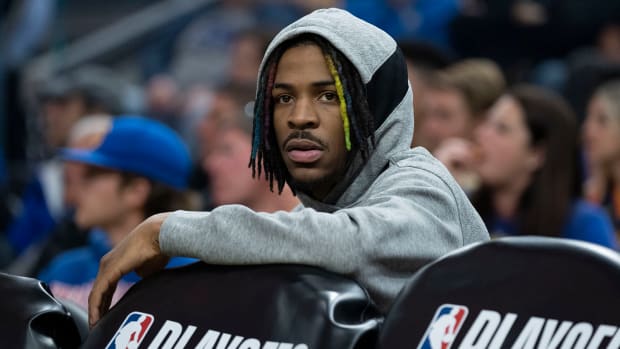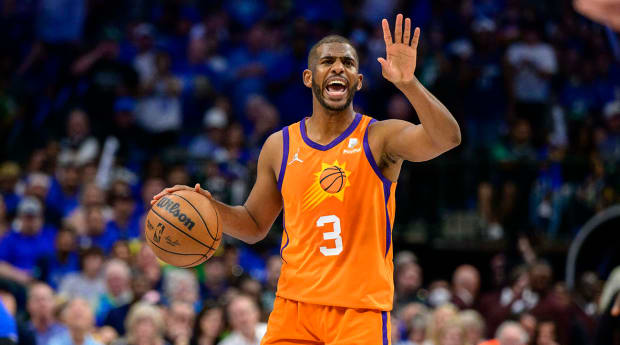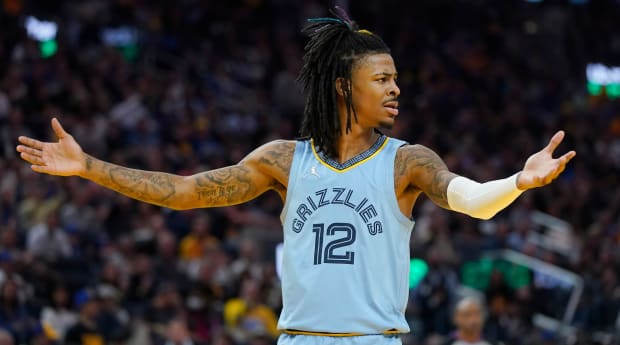If you’ve watched the NBA for long enough, you’ve undoubtedly seen the league go through its fair share of seismic changes.
Salaries have exploded, with the average annual number per player being nearly 10 times higher than it was during the early 1990s. Then there’s the proliferation of three-point shooting, which didn’t even exist in the NBA until the 1979–80 campaign. Games are also turned on their head, tilted on their side and shaken about several times a contest because of official reviews, which give refs the ability to use replay to overturn or confirm previous calls they’ve made.
But one thing that seems to have ratcheted up considerably this year has to do more with ethics, which have clearly gone by the wayside at times in shows of emotion. More specifically, a number of folks throughout the league have openly speculated about the perceived intentionality or recklessness of physical plays that have resulted in injuries.
Sign up to get Chris Herring’s The Playmaker in your inbox every Tuesday at SI.com/newsletters.

Kyle Terada/USA TODAY Sports
- The most recent was this past weekend, after Grizzlies star Ja Morant left Game 3 of the Memphis–Golden State series following a play in which Warriors guard Jordan Poole was reaching on defense and made contact with Morant’s right knee. Morant, 22, initially tweeted—then deleted—a slow-motion replay of the incident along with the phrase “broke the code.” His coach, Taylor Jenkins, seemed to suggest Poole’s effort was ill-advised, too, saying he believed Poole “grabbed at his knee and yanked it,” adding that the All-Star was definitively hurt on that play. (Morant jumped up and down at one point earlier in Game 3 after appearing to bang knees with Klay Thompson. The league opted not to come down on Poole, who doesn’t have a track record in terms of these types of incidents, as a result of the play.)
- The “broke the code” phrasing Morant used was him returning serve after Warriors coach Steve Kerr used the same words when speaking about Grizzlies wing Dillon Brooks after Game 2. Brooks, of course, recklessly swatted at Gary Payton II in the midst of a transition play that resulted in Payton falling hard and fracturing his elbow. (Brooks looked as if he may have been going for the ball but clubbed Payton in the head, making it nearly impossible for the guard to land in a controlled manner. Brooks was hit with a flagrant-2 and got ejected. He was also suspended for Game 3.)
- During the regular season, Kerr spoke of the “dangerous” nature of a play in which Boston’s Marcus Smart dove for a loose ball, an effort that inadvertently injured Steph Curry’s left foot, forcing him to miss the last four weeks or so of the season. (Curry said the play by Smart was neither malicious nor dirty.)
- And even last round, Raptors star Pascal Siakam accused Joel Embiid of making “dirty plays” during Game 4 of the series between Toronto and Philadelphia, which brought about questions from some after Game 5, when Siakam elbowed Embiid in the face. We later learned the move had broken the MVP runner-up’s orbital bone and left him with a concussion. (In the moments right after Embiid got whacked in the face, Raptors announcer Jack Armstrong said Embiid “deserved” to get hit because of his antics throughout the series. He later apologized for the comments, after the extent of Embiid’s injury was revealed. Siakam apologized to Embiid, and Embiid—a fellow Cameroonian with Siakam—said he didn’t believe the play to be intentional.)
Yes, these sorts of questions generally rise to the top of the conversation once or twice per year. Matthew Dellavedova was Public Enemy No. 1 to scores of NBA fans for a while. Grayson Allen had a reputation for controversial plays before he even made it to the NBA, which played into why he caught so much heat earlier this season for flagrantly fouling Chicago’s Alex Caruso, which resulted in Caruso fracturing his wrist. And we all remember the play from five years ago, in which then Warriors center Zaza Pachulia—a player with a checkered-enough history in these sorts of plays—gave Spurs superstar Kawhi Leonard no space to land after a jump shot, resulting in Leonard coming down on Pachulia’s foot. (Gregg Popovich used extraordinarily strong language in condemning Pachulia’s role in the play.) Leonard’s injury, which essentially spelled the end of what could have been a fantastic series between the Spurs and Warriors in 2017, also more or less spelled the end of Leonard’s time with the Spurs and altered the course of basketball history not just here, but in Canada, too.
But even with those incidents in mind, it does feel like players and coaches are getting more and more comfortable speculating about intent as of late, even when there isn’t much of an individual track record involved. Brooks, for instance, is certainly hard-nosed—he’s among the most prominent foulers in the league—and you’ll find fan bases that don’t like his antics. Still there’s a pretty wide span between that and definitively being a dirty player, in my view.
Before getting on my soapbox, let me first credit players like Embiid and Curry, who’ve gone out of their way to vouch for their opponents, essentially to say they don’t believe that the plays that hurt them were made intentionally. To do that is to take a high, high road when it could be understood if they instead chose to stay silent or further inflame an incident.
On the flip side, though, there’s something particularly off to me about accusing NBA players of intentionally injuring folks most times. Aside from the fact that it’s a pretty tribal sort of thing—for instance, I can’t remember a time where Kerr was concurring that the polarizing Green’s sometimes over-the-line nature was breaching any sort of ethical boundary—it’s also worth considering that we now live in an era when threats can be lobbed at players more directly and more anonymously than ever before.
Watch NBA games online all season long with fuboTV: Start with a 7-day free trial!
While everyone is free to speak their minds, if something isn’t clearly being done with intent, anyone of stature that suggests an intentional ugliness was at play is more or less throwing someone to the dogs, both on social media and potentially at the games, where we’ve had a growing number of bizarre incidents in the last year since fans were allowed back into arenas.

Jerome Miron/USA TODAY Sports
This past weekend, Chris Paul took issue with a person in the Dallas crowd “[putting] hands on [his] mom,” to which the Mavericks responded with a temporary ban. During the first round, fans repeatedly ran directly onto the court in Minnesota in hopes of drawing attention to their protests. It was only last year that we saw Russell Westbrook get popcorn dumped on him by a fan. A Boston fan threw a water bottle at former Celtic Kyrie Irving. And, of course, someone at Madison Square Garden sought to spit on Atlanta’s Trae Young during a playoff game, in the midst of a damn pandemic.
This isn’t to say there’s a complete, direct line between what players and coaches say about flagrant fouls above the shoulders. Many times, those comments are likely more so directed at the league, to influence officials to initiate a suspension. Or, if not that, it’s for coaches to publicly have their players’ backs, particularly with younger teams, like Memphis, which could easily splinter due to a relative lack of experience on this sort of stage.
Still, with fans acting out, and a handful of players having complained about social media threats made to them or their family members in recent years, I think it’s worth considering the magnitude of the accusations in an already heated, inflamed playoff environment, and how folks already looking for a reason to act out might become even more charged up over their favorite player or coach lighting a match underneath them.
Meat and potatoes: Good reads from SI and elsewhere this past week

AP Photo/Jeff Chiu
- Speaking of Poole’s foul, and the conversation it created concerning “the code,” Howard Beck wrote about the league’s unwritten rules and how they’re manifesting in today’s NBA.
- Michael Pina’s written on the Grizzlies a couple of times over the past week: first with a solid Daily Cover piece on the emergence of Desmond Bane, who’s piecing together one of the more impressive early-career runs we’ve ever seen from deep. The other was on how Ja Morant continues to haunt Golden State, even after his Game 3 injury.
- And while the Warriors now have a chance to close out Memphis, we repubbed a piece I wrote on the Grizzlies recently, concerning how they’ve been able to hold their own so well without Morant this season. It’s something they did yet again on Monday, albeit in a close loss.
- Switching gears, Chris Mannix wrote off 35-year-old Al Horford’s incredible Game 4, which might have saved Boston’s season against defending champion Milwaukee on Monday night.
- Rohan Nadkarni wrote about what’s ailed the Suns lately and how things have been less than stellar since Chris Paul turned 37 years old, between the first seven-turnover half of his career, and his stunning foul-out early in the fourth quarter of Game 4 with Dallas. Phoenix desperately needs his best stuff to turn the tide.
I also wanted to shine a bright light on the WNBA season, which kicked off this past weekend.
- SI’s Ben Pickman had takeaways from the opening games, and a fantastic piece on the return of AD, previously known as Asia Durr, who sat out two years after dealing with long-haul COVID.
- Wilton Jackson touched on Candace Parker’s comments about this possibly being her last season. Similarly, Jon Wertheim had a recent Q&A with Sue Bird about what figures to be her last year.
- Madison Williams wrote on Diamond DeShields opening up about a career-threatening surgery in 2020, when a tumor pressed on her spine. The surgery left her unable to walk before her return and fairy-tale ending as a WNBA champion with the Sky this past year.
- Howard Megdal recently had a Daily Cover piece on Russia and how the Brittney Griner situation has pushed the WNBA to a crossroads.
- Lastly, though it isn’t quite WNBA, I wanted to highlight a thorough, yet tough-to-read piece by Chantel Jennings and Dana O’Neil at The Athletic, which uncovered a number of troubling allegations from ex-players who suited up for former WNBA great and college coach Cynthia Cooper-Dyke.
Thanks for reading The Playmaker. Feel free to forward this email to a friend or tell them to sign up at SI.com/newsletters. If you have any specific questions, just reply to this email or send a note to nba@si.com and I may answer it in a future edition.
Sports Illustrated may receive compensation for some links to products and services on this website.







